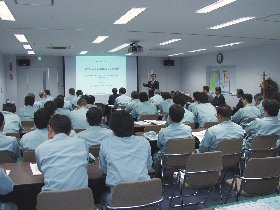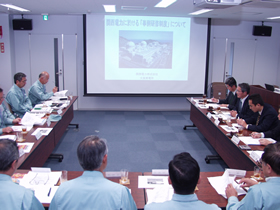|
|
 |
On 29th May 2002, the 35th Safety Caravan was held at Tokai Works of Nuclear Fuel Industries, Ltd., which is located in Tokai-mura, Naka-gun, Ibaraki Prefecture.
|
Safety Presentation |
About 50 persons including staff of Tokai Works and cooperating companies attended the safety presentation. The director and head of Tokai Works, opened the safety presentation with the following greeting: "We had Peer Review and comments including recommendations for improvements by NSnet the year before last. We responded to those comments, and have also been doing such activities as joining seminars and introducing the booklet entitled "What is nuclear safety culture?" issued by NSnet in our morning meetings. As May is also the month for nuclear energy safety, we are very grateful to have this opportunity to listen to the safety presentation in Safety Caravan and exchange opinions".
|

Safety Presentation
|
a lecturer from the Central Research Institute of Electric Power Industry made a presentation entitled "Aspects of risk assessment and practical examples of safety precautions".
|
The lecturer touched on such topics as the following:
- By definition, a risk is the result of multiplying the probability of occurrence of a hazard by its severity, and a hazard is a physical or health disturbance to the human body, or damage to property or the environment;
- In risk management, we assume hazardous events and assess the degree of danger on an event-by-event basis and implement risk assessment to evaluate the acceptance levels. If the result is acceptable, the evaluation is completed. However, if it is unacceptable, we have to take measures (in the following order) such as making essential changes, providing safeguards, and issuing precautions on use so that we can reduce the risk to the allowable range;
- Unlike in Europe and the United States, risk assessment is not enshrined in law in Japan, thus individual companies address the assessment on a voluntary basis. Also, assessment techniques have not been established, and training and experience are necessary to use them; and
- Introduction of two companies that are engaged in detecting potential risks and eliminating risks. In closing, it was mentioned that organizations which have systematically caused accidents and acted improperly have common aspects such as focusing on the schedule rather than safety, an atmosphere of not disclosing irregularities under the strict regulations, and top management emphasizing results rather than the process.
|
| Safety information exchange session |

Safety information exchange session
|
From this time, as the second round of Safety Caravan starts, the meeting that was formerly referred to as a "discussion session" was renamed as a "safety information exchange session". The program was reviewed and modified to facilitate effective discussion by narrowing down the subjects, and focusing on introductions and discussions of good examples of peer reviews and how the visited organization is fostering a culture of nuclear safety.
In the safety information exchange session, at the request of Nuclear Fuel Industries, a good example of a peer review on the Ohi Nuclear Power Station of Kansai Electric Power Company, "Implementation of 'Case Study' by present and former staff who have experienced troubles", was introduced in detail by a lecturer from the organization.
This was followed by questions and answers and an exchange of opinions on the topic. Then, Nuclear Fuel Industries introduced their efforts to foster a culture of nuclear safety in Tokai Works, which was followed by discussions on it.
The discussions included the following opinions:
- Activities related to safety are very important and should be assessed properly.
- It is often said that for risk management and safe management, "two-way communication is important, and so the attitude of top management is essential". People strongly believe that a company whose risk management department is not performing well is not good. Top management must recognize the importance of their risk management department.
|
|
|







